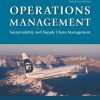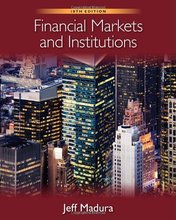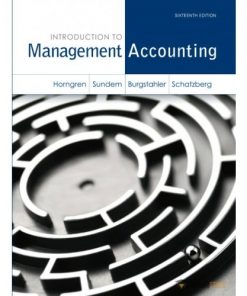Financial Markets and Institutions Madura 10th Edition Test Bank
$35.00
Financial Markets and Institutions Madura 10th Edition Test Bank
You will receive this product immediate after placing the order
Financial Markets and Institutions
Financial Markets and Institutions Madura
Financial Markets and Institutions Madura 10th
Financial Markets and Institutions Madura 10th Test Bank
Financial Markets and Institutions Madura 10th Edition Test Bank
*** YOU ARE BUYING the Test Bank ***
Name: Financial Markets and Institutions
Author: Madura
Edition: 10th
Type: Test Bank
– there’s a very high chance that you will see a very similar, if not exact the exact, question in the test!
–
–
If you have any questions, please feel free to contact us. Our response is the fastest. All questions will always be answered in 6 hours., most of the time within 30mins
We also faced similar difficulities when we were students, and we understand how you feel.
But now, with the Financial Markets and Institutions 10th Test Bank, you will be able to
* Anticipate the type of the questions that will appear in your exam.
* Reduces the hassle and stress of your student life.
* Improve your studying and also get a better grade!
* Get prepared for examination questions.
* Can save you time and help you understand the material.
This is the quality of service we are providing and we hope to be your helper.
Test Bank is accurate.
Prepare to receive your Financial Markets and Institutions 10th Test Bank in the next moment.
If you have any questions, or would like a receive a sample chapter before your purchase, please contact us at [email protected]
Financial Markets and Institutions
Financial Markets and Institutions Madura
Financial Markets and Institutions Madura 10th
Financial Markets and Institutions Madura 10th Test Bank
Financial Markets and Institutions Madura 10th Edition Test Bank
Chapter 1—Role of Financial Markets and Institutions
1. Financial market participants who provide funds are called
a. deficit units.
b. surplus units.
c. primary units.
d. secondary units.
ANS: B PTS: 1 DIF: Easy OBJ: FMAI.MADU.15.01.01
NAT: BUSPROG.FMAI.MADU.15.03 STA: DISC.FMAI.MADU.15.02
KEY: Bloom’s: Knowledge
2. The main provider(s) of funds to the U.S. Treasury is (are)
a. households and businesses.
b. foreign financial institutions.
c. the Federal Reserve System.
d. foreign nonfinancial sectors.
ANS: A PTS: 1 DIF: Easy OBJ: FMAI.MADU.15.01.01
NAT: BUSPROG.FMAI.MADU.15.03 STA: DISC.FMAI.MADU.15.02
KEY: Bloom’s: Knowledge
3. The largest deficit unit is (are)
a. households and businesses.
b. foreign financial institutions.
c. the U.S. Treasury.
d. foreign nonfinancial sectors.
ANS: C PTS: 1 DIF: Easy OBJ: FMAI.MADU.15.01.01
NAT: BUSPROG.FMAI.MADU.15.03 STA: DISC.FMAI.MADU.15.02
KEY: Bloom’s: Knowledge
4. Those financial markets that facilitate the flow of short-term funds are known as
a. money markets.
b. capital markets.
c. primary markets.
d. secondary markets.
ANS: A PTS: 1 DIF: Easy OBJ: FMAI.MADU.15.01.02
NAT: BUSPROG.FMAI.MADU.15.02 STA: DISC.FMAI.MADU.15.02
KEY: Bloom’s: Knowledge
5. Funds are provided to the initial issuer of securities in the
a. secondary market.
b. primary market.
c. deficit market.
d. surplus market.
ANS: B PTS: 1 DIF: Easy OBJ: FMAI.MADU.15.01.01
NAT: BUSPROG.FMAI.MADU.15.03 STA: DISC.FMAI.MADU.15.02
KEY: Bloom’s: Knowledge
6. Which of the following is a capital market instrument?
a. a six-month CD
b. a three-month Treasury bill
c. a ten-year bond
d. an agreement for a bank to loan funds directly to a company for nine months
ANS: C PTS: 1 DIF: Moderate OBJ: FMAI.MADU.15.01.02
NAT: BUSPROG.FMAI.MADU.15.03 STA: DISC.FMAI.MADU.15.02
KEY: Bloom’s: Comprehension
7. Which of the following is a money market security?
a. Treasury note
b. municipal bond
c. mortgage
d. commercial paper
ANS: D PTS: 1 DIF: Moderate OBJ: FMAI.MADU.15.01.02
NAT: BUSPROG.FMAI.MADU.15.03 STA: DISC.FMAI.MADU.15.02
KEY: Bloom’s: Comprehension
8. The creditors in the federal funds market are
a. households.
b. depository institutions.
c. firms.
d. government agencies.
ANS: B PTS: 1 DIF: Easy OBJ: FMAI.MADU.15.01.03
NAT: BUSPROG.FMAI.MADU.15.03 STA: DISC.FMAI.MADU.15.02
KEY: Bloom’s: Knowledge
9. Equity securities have a ____ expected return than most long-term debt securities, and they exhibit a ____ degree of risk.
a. higher; higher
b. lower; lower
c. lower; higher
d. higher; lower
ANS: A PTS: 1 DIF: Moderate OBJ: FMAI.MADU.15.01.02
NAT: BUSPROG.FMAI.MADU.15.03 STA: DISC.FMAI.MADU.15.02
KEY: Bloom’s: Comprehension
10. Money market securities generally have ____. Capital market securities are typically expected to have a ____.
a. less liquidity; higher annualized return
b. more liquidity; lower annualized return
c. less liquidity; lower annualized return
d. more liquidity; higher annualized return
ANS: D PTS: 1 DIF: Moderate OBJ: FMAI.MADU.15.01.02
NAT: BUSPROG.FMAI.MADU.15.03 STA: DISC.FMAI.MADU.15.02
KEY: Bloom’s: Comprehension
11. If security prices fully reflect all available information, the markets for these securities are
a. efficient.
b. primary.
c. overvalued.
d. undervalued.
ANS: A PTS: 1 DIF: Easy OBJ: FMAI.MADU.15.01.02
NAT: BUSPROG.FMAI.MADU.15.03 STA: DISC.FMAI.MADU.15.02
KEY: Bloom’s: Knowledge
12. If markets are ____, investors could use available information ignored by the market to earn abnormally high returns.
a. perfect
b. active
c. inefficient
d. in equilibrium
ANS: C PTS: 1 DIF: Moderate OBJ: FMAI.MADU.15.01.02
NAT: BUSPROG.FMAI.MADU.15.03 STA: DISC.FMAI.MADU.15.02
KEY: Bloom’s: Knowledge
13. If financial markets are efficient, this implies that all securities should earn the same return.
a. True
b. False
ANS: F PTS: 1 DIF: Easy OBJ: FMAI.MADU.15.01.02
NAT: BUSPROG.FMAI.MADU.15.03 STA: DISC.FMAI.MADU.15.02
KEY: Bloom’s: Comprehension
14. The Securities Act of 1933
a. required complete disclosure of relevant financial information for publicly offered securities in the primary market.
b. declared trading strategies to manipulate the prices of public secondary securities illegal.
c. declared misleading financial statements for public primary securities illegal.
d. required complete disclosure of relevant financial information for securities traded in the secondary market.
e. all of the above
ANS: A PTS: 1 DIF: Easy OBJ: FMAI.MADU.15.01.02
NAT: BUSPROG.FMAI.MADU.15.03 STA: DISC.FMAI.MADU.15.02
KEY: Bloom’s: Knowledge
15. The Securities Exchange Commission (SEC) was established by the
a. Federal Reserve Act.
b. McFadden Act.
c. Securities Exchange Act of 1934.
d. Glass-Steagall Act.
e. none of the above
ANS: C PTS: 1 DIF: Easy OBJ: FMAI.MADU.15.01.02
NAT: BUSPROG.FMAI.MADU.15.03 STA: DISC.FMAI.MADU.15.02
KEY: Bloom’s: Knowledge
16. Common stock is an example of a(n)
a. debt security.
b. money market security.
c. equity security.
d. A and B
ANS: C PTS: 1 DIF: Easy OBJ: FMAI.MADU.15.01.03
NAT: BUSPROG.FMAI.MADU.15.03 STA: DISC.FMAI.MADU.15.02
KEY: Bloom’s: Knowledge
17. If financial markets were ____, all information about any securities for sale in primary and secondary markets would be continuously and freely available to investors.
a. efficient
b. inefficient
c. perfect
d. imperfect
ANS: C PTS: 1 DIF: Easy OBJ: FMAI.MADU.15.01.03
NAT: BUSPROG.FMAI.MADU.15.03 STA: DISC.FMAI.MADU.15.02
KEY: Bloom’s: Comprehension
18. The typical role of a securities firm in a public offering of securities is to
a. purchase the entire issue for its own investment.
b. place the entire issue with a single large investor.
c. spread the issue across several investors until the entire issue is sold.
d. provide all large investors with loans so that they can invest in the offering.
ANS: C PTS: 1 DIF: Moderate OBJ: FMAI.MADU.15.01.03
NAT: BUSPROG.FMAI.MADU.15.03 STA: DISC.FMAI.MADU.15.02
KEY: Bloom’s: Knowledge
19. Without the participation of financial intermediaries in financial market transactions,
a. information and transaction costs would be lower.
b. transaction costs would be higher but information costs would be unchanged.
c. information costs would be higher but transaction costs would be unchanged.
d. information and transaction costs would be higher.
ANS: D PTS: 1 DIF: Moderate OBJ: FMAI.MADU.15.01.03
NAT: BUSPROG.FMAI.MADU.15.03 STA: DISC.FMAI.MADU.15.02
KEY: Bloom’s: Comprehension
20. Which of the following is most likely to be described as a depository institution?
a. finance companies
b. securities firms
c. credit unions
d. pension funds
e. insurance companies
ANS: C PTS: 1 DIF: Easy OBJ: FMAI.MADU.15.01.03
NAT: BUSPROG.FMAI.MADU.15.03 STA: DISC.FMAI.MADU.15.02
KEY: Bloom’s: Knowledge
21. In aggregate, ____ are the most dominant depository institution, with more total assets than other depository institutions.
a. commercial banks
b. savings banks
c. credit unions
d. S&Ls
ANS: A PTS: 1 DIF: Easy OBJ: FMAI.MADU.15.01.03
NAT: BUSPROG.FMAI.MADU.15.03 STA: DISC.FMAI.MADU.15.02
KEY: Bloom’s: Knowledge
22. Which of the following is a nondepository financial institution?
a. savings banks
b. commercial banks
c. savings and loan associations
d. mutual funds
ANS: D PTS: 1 DIF: Easy OBJ: FMAI.MADU.15.01.03
NAT: BUSPROG.FMAI.MADU.15.03 STA: DISC.FMAI.MADU.15.02
KEY: Bloom’s: Knowledge
23. Which of the following distinguishes credit unions from commercial banks and savings institutions?
a. Credit unions are non-profit
b. Credit unions accept deposits but do not make loans
c. Credit unions make loans but do not accept deposits
d. Savings institutions restrict their business to members who share a common bond
ANS: A PTS: 1 DIF: Moderate OBJ: FMAI.MADU.15.01.03
NAT: BUSPROG.FMAI.MADU.15.03 STA: DISC.FMAI.MADU.15.02
KEY: Bloom’s: Comprehension
24. When a securities firm acts as a broker, it
a. guarantees the issuer a specific price for newly issued securities.
b. makes a market in specific securities by adjusting its own inventory.
c. executes transactions between two parties.
d. purchases securities for its own account.
ANS: C PTS: 1 DIF: Easy OBJ: FMAI.MADU.15.01.03
NAT: BUSPROG.FMAI.MADU.15.03 STA: DISC.FMAI.MADU.15.02
KEY: Bloom’s: Knowledge
25. When a securities firm acts as a(n) ____, it maintains a position in securities.
a. adviser
b. dealer
c. broker
d. none of the above
ANS: B PTS: 1 DIF: Easy OBJ: FMAI.MADU.15.01.03
NAT: BUSPROG.FMAI.MADU.15.03 STA: DISC.FMAI.MADU.15.02
KEY: Bloom’s: Knowledge
26. ____ obtain funds by issuing securities, then lend the funds to individuals and small businesses.
a. Finance companies
b. Securities firms
c. Mutual funds
d. Insurance companies
ANS: A PTS: 1 DIF: Easy OBJ: FMAI.MADU.15.01.03
NAT: BUSPROG.FMAI.MADU.15.03 STA: DISC.FMAI.MADU.15.02
KEY: Bloom’s: Knowledge
27. Households with ____ are served by ____.
a. deficient funds; depository institutions and finance companies
b. deficient funds; finance companies only
c. savings; finance companies only
d. savings; pension funds and finance companies
ANS: A PTS: 1 DIF: Moderate OBJ: FMAI.MADU.15.01.03
NAT: BUSPROG.FMAI.MADU.15.03 STA: DISC.FMAI.MADU.15.02
KEY: Bloom’s: Knowledge
28. ____ concentrate on mortgage loans.
a. Finance companies
b. Commercial banks
c. Savings institutions
d. Credit unions
ANS: C PTS: 1 DIF: Easy OBJ: FMAI.MADU.15.01.03
NAT: BUSPROG.FMAI.MADU.15.03 STA: DISC.FMAI.MADU.15.02
KEY: Bloom’s: Knowledge
29. ____ securities have a maturity of one year or less; ____ securities are generally more liquid.
a. Money market; capital market
b. Money market; money market
c. Capital market; money market
d. Capital market; capital market
ANS: B PTS: 1 DIF: Moderate OBJ: FMAI.MADU.15.01.02
NAT: BUSPROG.FMAI.MADU.15.03 STA: DISC.FMAI.MADU.15.02
KEY: Bloom’s: Knowledge
30. Which of the following is not a major investor in stocks?
a. commercial banks
b. insurance companies
c. mutual funds
d. pension funds
ANS: A PTS: 1 DIF: Easy OBJ: FMAI.MADU.15.01.03
NAT: BUSPROG.FMAI.MADU.15.03 STA: DISC.FMAI.MADU.15.02
KEY: Bloom’s: Knowledge
31. Which of the following financial intermediaries commonly invests in stocks and bonds?
a. pension funds
b. insurance companies
c. mutual funds
d. all of the above
ANS: D PTS: 1 DIF: Easy OBJ: FMAI.MADU.15.01.03
NAT: BUSPROG.FMAI.MADU.15.03 STA: DISC.FMAI.MADU.15.02
KEY: Bloom’s: Knowledge
32. Securities are certificates that represent a claim on the issuer.
a. True
b. False
ANS: T PTS: 1 DIF: Easy OBJ: FMAI.MADU.15.01.01
NAT: BUSPROG.FMAI.MADU.15.03 STA: DISC.FMAI.MADU.15.02
KEY: Bloom’s: Knowledge
33. Debt securities are certificates that represent debt (borrowed funds) by the issuer.
a. True
b. False
ANS: T PTS: 1 DIF: Easy OBJ: FMAI.MADU.15.01.01
NAT: BUSPROG.FMAI.MADU.15.03 STA: DISC.FMAI.MADU.15.02
KEY: Bloom’s: Knowledge
34. A five-year security was purchased two years ago by an investor who plans to resell it. The security will be sold by the investor in the so-called
a. secondary market.
b. primary market.
c. deficit market.
d. surplus market.
ANS: A PTS: 1 DIF: Moderate OBJ: FMAI.MADU.15.01.01
NAT: BUSPROG.FMAI.MADU.15.03 STA: DISC.FMAI.MADU.15.02
KEY: Bloom’s: Comprehension
35. When security prices fully reflect all available information, the markets for these securities are said to be efficient.
a. True
b. False
ANS: T PTS: 1 DIF: Easy OBJ: FMAI.MADU.15.01.01
NAT: BUSPROG.FMAI.MADU.15.03 STA: DISC.FMAI.MADU.15.02
KEY: Bloom’s: Knowledge
36. If markets are perfect, securities buyers and sellers to not have full access to information and cannot always break down securities to the precise size they desire.
a. True
b. False
ANS: F PTS: 1 DIF: Moderate OBJ: FMAI.MADU.15.01.03
NAT: BUSPROG.FMAI.MADU.15.03 STA: DISC.FMAI.MADU.15.02
KEY: Bloom’s: Knowledge
37. A broker executes securities transactions between two parties and charges a fee reflected in the bid-ask spread.
a. True
b. False
ANS: T PTS: 1 DIF: Easy OBJ: FMAI.MADU.15.01.03
NAT: BUSPROG.FMAI.MADU.15.03 STA: DISC.FMAI.MADU.15.02
KEY: Bloom’s: Knowledge
38. The euro increased business between European countries and created a more competitive environment in Europe.
a. True
b. False
ANS: T PTS: 1 DIF: Easy OBJ: FMAI.MADU.15.01.03
NAT: BUSPROG.FMAI.MADU.15.03 STA: DISC.FMAI.MADU.15.02
KEY: Bloom’s: Knowledge
39. In recent years, financial institutions have consolidated to capitalize on economies of scale and on economies of scope.
a. True
b. False
ANS: T PTS: 1 DIF: Easy OBJ: FMAI.MADU.15.01.03
NAT: BUSPROG.FMAI.MADU.15.03 STA: DISC.FMAI.MADU.15.02
KEY: Bloom’s: Knowledge
40. Securities are certificates that represent a claim on the provider of funds.
a. True
b. False
ANS: T PTS: 1 DIF: Easy OBJ: FMAI.MADU.15.01.01
NAT: BUSPROG.FMAI.MADU.15.03 STA: DISC.FMAI.MADU.15.02
KEY: Bloom’s: Knowledge
41. Debt securities include commercial paper, Treasury bonds, and corporate bonds.
a. True
b. False
ANS: T PTS: 1 DIF: Easy OBJ: FMAI.MADU.15.01.01
NAT: BUSPROG.FMAI.MADU.15.03 STA: DISC.FMAI.MADU.15.02
KEY: Bloom’s: Knowledge
42. Common types of capital market securities include Treasury bills and commercial paper.
a. True
b. False
ANS: F PTS: 1 DIF: Moderate OBJ: FMAI.MADU.15.01.02
NAT: BUSPROG.FMAI.MADU.15.03 STA: DISC.FMAI.MADU.15.02
KEY: Bloom’s: Knowledge
43. Common types of money market securities include negotiable certificates of deposit and Treasury bills.
a. True
b. False
ANS: T PTS: 1 DIF: Easy OBJ: FMAI.MADU.15.01.02
NAT: BUSPROG.FMAI.MADU.15.03 STA: DISC.FMAI.MADU.15.02
KEY: Bloom’s: Knowledge
44. Money market securities are commonly issued in order to finance the purchase of assets such as buildings, equipment, or machinery.
a. True
b. False
ANS: F PTS: 1 DIF: Easy OBJ: FMAI.MADU.15.01.02
NAT: BUSPROG.FMAI.MADU.15.03 STA: DISC.FMAI.MADU.15.02
KEY: Bloom’s: Knowledge
45. The total asset value of savings institutions is larger than that of commercial banks.
a. True
b. False
ANS: F PTS: 1 DIF: Easy OBJ: FMAI.MADU.15.01.03
NAT: BUSPROG.FMAI.MADU.15.03 STA: DISC.FMAI.MADU.15.02











Reviews
There are no reviews yet.